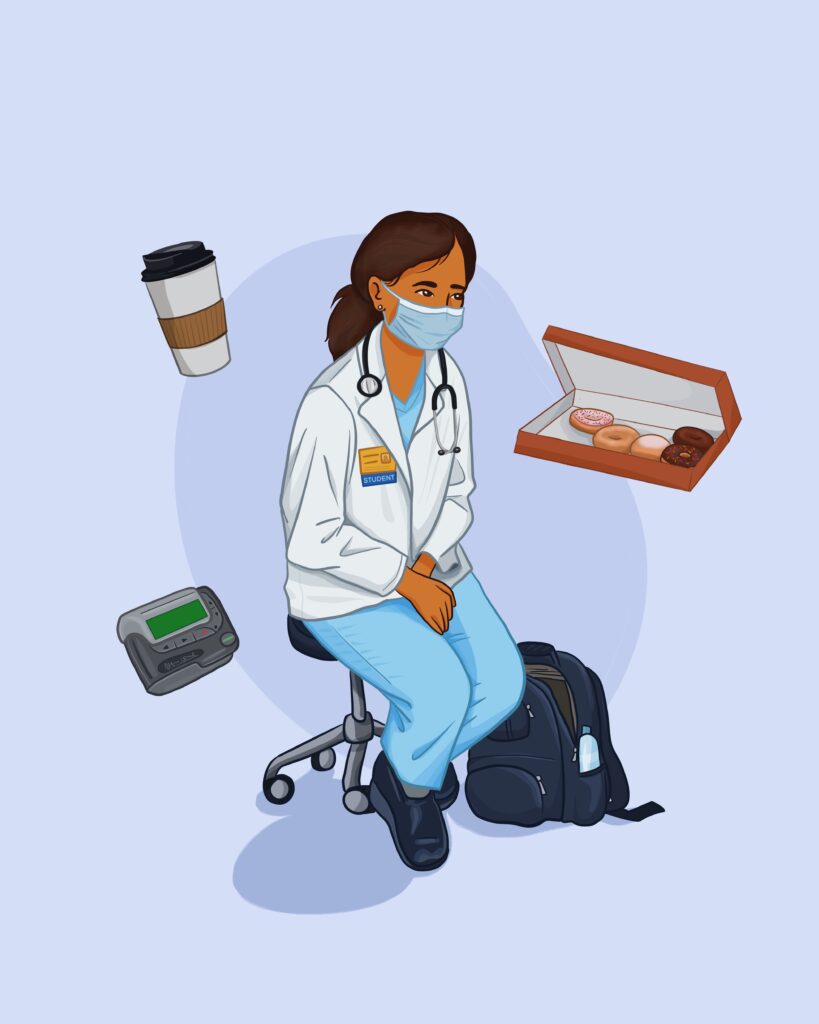Kirin Saint
Ann Arbor, MI

Today is Monday, May 2. The day starts before the sun has risen, before pink-lavender hues warm the earth, as two internal medicine interns slink in, yawning and bleary eyed, careful not to spill their coffee onto their well-worn scrubs. The residents stride into the room, greet one another, lament the new overnight admissions, and sign in to their computers. Hands moving deftly, they drive the cursors on their screens and scratch little notes onto papers. At random times they stride out of the room with stethoscopes slung around their necks and running shoes squeaking as they hurry to their patients’ sides. Next come the medical students in stiff hospital scrubs, with overstuffed backpacks and lunch boxes slung across their chests. It is their first day, and they furtively check their phones and glance around. The senior resident tells them where to sit. They shirk into a corner and set up their laptops. They perch carefully on their stools with tightly crossed legs as they try to log onto the patient charts.
The morning passes with a flurry of blue scrubs buzzing in and out, clutching sheets of notes, with a background cacophony of hospital phones’ blaring rings. When the well-dressed doctor in a long white coat enters around 8:30 am, the others sit up a bit straighter. Beneath her name her badge reads “Attending” in large, bold letters. The senior resident turns away from her computer and laughs loudly at the attending’s jokes. The medical students smile politely, readily giving up their seats in case the attending physician requires one. “No, it’s fine, I don’t mind standing,” she says. “Really, no, please, not at all.”
After 9:30 am, the stale aroma of Keurig coffee mingled with yesterday’s donuts remains in the air. When the people come back from rounds, they go straight to their computer stations and start to type frantically, make phone calls, and receive more screeching pages. Soon a disagreement erupts between a consultant on the phone and the senior resident. The resident’s cheeks turn red and her voice raises to the ceiling. A medical student does deep breathing exercises to clear the pulsing air.
The students are the quietest workers, typing with furrowed brows, tentatively asking a question to an intern. In response, the intern keeps his eyes glued to his screen. He appears busy and disgruntled as he responds with his fingers still flying across the keyboard. The student turns back to their desk, their facial expression appearing slightly hurt. They are new to the team and struggling to adjust.
Around noon the residents leave for a lunch conference, and the students remain behind. Once the residents are out of sight, the students stand up, stretch, check their phones. They chat with each other, debrief about the morning, laugh about funny moments, and worry about their upcoming exam. When the residents return, the students turn back to their computers, shrinking back down as they busy themselves in the patient charts.
A little later, a code is called, and loud sirens pierce the air. All team members jump up to assist. When they return, activity slows to a lull. Later, the consultants come in to chat about patients, and a new batch of students arrive dressed in freshly pressed scrubs, eyes wide open with eagerness, and in awe to be in a real-life hospital. The older students tell them where to hang their coats and where to sit. They timidly ask a question to the more experienced students, who slowly turn around to answer with a slight air of superiority and a dismissive behavior learned from their own resident interactions.
Sometime in the late afternoon, the team members finally sign their notes and tuck their patients in for the evening. The students usually finish first, followed by the residents. They pack their bags, grab their coats, and stride out the doors. The sun starts to set in the west, blurring the sky with its soft orange tones as it calls for impending darkness.
KIRIN SAINT is a fourth-year medical student at the University of Michigan. She is applying into internal medicine and is curious about hospital medicine and palliative care. Kirin has been an avid reader since elementary school and has found writing to be a helpful tool to process the complex emotions that accompany medical training and patient care. In her spare time, she can be found playing pickleball, picnicking with friends, or teaching yoga.
Submitted for the 2022–23 Medical Student Essay Contest and Highlighted Vignette Volume 15, Issue 3 – Summer 2023

Leave a Reply